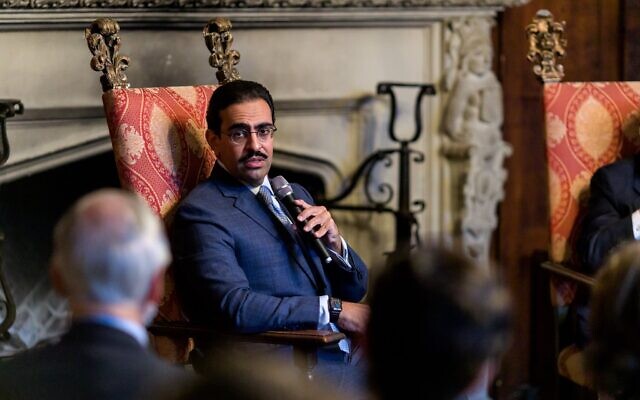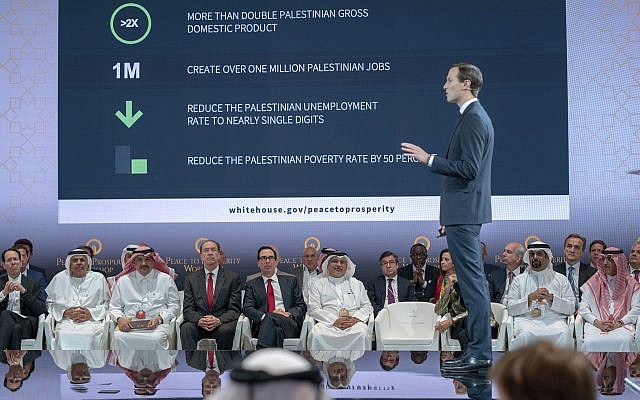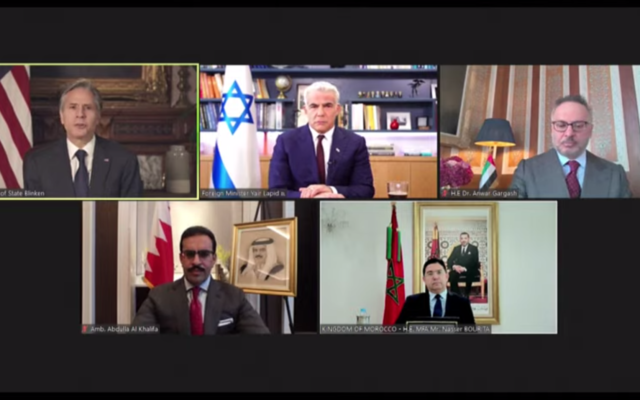WASHINGTON — Bahrain’s ambassador to the United States hopes Prime Minister Benjamin Netanyahu will remain committed to advancing the Abraham Accords, despite the “challenges” posed by his coalition partners in Israel’s new hardline government.
“Even though there might be a lot of challenges around the prime minister, it’s our hope that he continues to realize the importance of what has happened,” Shaikh Abdulla bin Rashid Al Khalifa told The Times of Israel in an interview last week at Bahrain’s embassy in Washington.
Since returning to the premiership a month ago, Netanyahu has emphasized that bolstering the 2020 normalization agreements Israel signed with the United Arab Emirates, Bahrain and Morocco would be a top priority, particularly when it comes to expanding the accords to include Saudi Arabia. The elusive goal has broad support in Israel, including from Netanyahu’s coalition partners.
However, the agreements cementing the establishment of the government include commitments to significantly expand Israel’s presence in the West Bank. Additionally, many of the ruling bloc’s lawmakers are ideologically opposed to Palestinian statehood, and some prominent members support upending the fragile status quo at Jerusalem’s Temple Mount, known to Muslims as the Noble Sanctuary, in order to allow Jewish prayer there.
Those positions are likely to complicate Israel’s efforts to expand the Abraham Accords, given that its new Arab allies are eager to maintain the perception that they have not abandoned the Palestinian cause.
Get The Times of Israel's Daily Edition by email and never miss our top stories
Khalifa noted that relations between Israel and Bahrain have continued to move forward since the new government was sworn in, and appeared optimistic that the trend would continue, given Netanyahu’s affinity for the Abraham Accords. “This has been one of the milestones within his entire political career,” he said.

Bahrain’s Ambassador to the US Shaikh Abdulla bin Rashid Al Khalifa speaks at the International Student House in Washington on October 8, 2021. (Abdulla bin Rashid Al Khalifa/Twitter)
Since Israel and Bahrain agreed to formally establish diplomatic ties in September 2020, the countries have signed over 40 memorandums of understanding, including a defense pact that has already led to enhanced security cooperation, thanks to the US decision to move Israel into CENTCOM alongside its Arab allies.
However, there has already been one hiccup under the new government, triggered by a visit to the Temple Mount by National Security Minister Itamar Ben Gvir, one of the lawmakers who campaigned on altering the status quo at the compound. Ben Gvir’s 13-minute lap around the site led to a flood of international condemnations, including from Bahrain.
Manama’s ambassador to Washington sought to diplomatically downplay the controversy. “Both peoples are starting to understand one another, and so the expectations have to also be understood,” Khalifa said, adding that maintaining the status quo at the Temple Mount is a crucial component of Bahrain’s broader support for the Palestinians.
“From day one on the South Lawn of the White House [where the accords were signed], we have been very direct about why we’re [normalizing ties with Israel], while at the same time maintaining our position on the two-state solution,” he said. “That position has not and will not change.”
Bahrain is seeking to advance its ties with Israel and the Palestinian issue on “parallel paths,” Khalifa said while noting that to “neglect” the latter arena would create challenges for his country.
The impact of a perception of reduced support for the Palestinians varies among Abraham Accords countries, with Khalifa indicating that Bahrain’s government is more vulnerable than the UAE, where domestic solidarity with Ramallah is more limited.
Sheikh Isa Qassim on #Israeli president’s upcoming visit to #Bahrain: Our proud people should say no to the desecration of the land of faith & dignity by the head of the Zionist entity. pic.twitter.com/P9pX4uSQNd
— LuaLuaTV (@LuaLuaEnglish) December 2, 2022
“There’s always a domestic [component]. For us in Bahrain, the more challenging [the Palestinian issue] becomes, the bigger the risk for us — as opposed to some of the other members of the Abraham Accords,” he said.
Indeed, opposition figures in Bahrain have been vocal in their criticism of the kingdom’s decision to normalize ties with Israel, and have held periodic protests against the move.
Khalifa said the population and the government “see eye-to-eye on the need to continue advocating for a two-state solution.” However, he indicated that there are times when the leadership recognizes “opportunities” before the population does. “We need everyone to recognize those opportunities and to be part of the success of those opportunities.”
On that note, the ambassador characterized as a “positive development” the emphasis the Biden administration has placed on leveraging the Abraham Accords to advance measures that can improve Palestinian livelihood.
For the UAE, this has meant highlighting how its decision to normalize ties with Israel was conditioned on Netanyahu’s agreement to shelve his plans to annex large parts of the West Bank. Morocco has pointed to its involvement in the talks with Israel to expand the opening hours at the Allenby Crossing between the West Bank and Jordan, which is primarily used by Palestinians.
Khalifa said Bahrain has used its unique diplomatic position to “be a platform for everyone involved to come and discuss the [Palestinian] issue.” He pointed to the 2019 Peace to Prosperity conference that Manama hosted and where the Trump administration unveiled the economic component of its peace plan, which envisioned millions in international investment for the Palestinians.
The Palestinian Authority boycotted the conference, viewing it as a form of “economic peace” promoted by the Israeli right, offering economic incentives to the Palestinians in lieu of political rights.

Illustrative: In this June 25, 2019, photo released by Bahrain News Agency, US Treasury Secretary Steven Mnuchin, fifth from left, and Bahrain Crown Prince Salman bin Hamad Al Khalifa, sixth from left, listen to White House senior adviser Jared Kushner, standing, during the opening session of the “Peace to Prosperity” workshop in Manama, Bahrain (Bahrain News Agency via AP)
“Unfortunately, we couldn’t get the Palestinians there, but we’re in a very different position today,” Bahrain’s ambassador said. “We kept our lines of communication with the Palestinian Authority open, and we will continue to do so.”
“We’re hopeful that continued dialogue is going to get the Palestinians closer to attending such a conference in the future,” he said.
As for Netanyahu, Khalifa expressed his hope that the longtime Israeli premier would be able to strike an “equilibrium” between maintaining ties with Abraham Accords countries and addressing the pressures he might be facing from his far-right coalition partners on issues relating to the Palestinians.
Moving forward, the Bahraini envoy is seeking to expand the bilateral agreements signed by various Abraham Accords members to a multilateral level, as the Negev Forum has sought to do. The initiative launched last spring added the US and Egypt to the original four Abraham Accords countries, with all six establishing working groups to advance regional projects in a variety of fields.

(Clockwise from top left) US Secretary of State Antony Blinken, Foreign Minister Yair Lapid, UAE diplomatic adviser Anwar Gargash, Bahrain’s Ambassador to the US Sheikh Abdullah bin Rashid al-Khalifa and Moroccan Foreign Minister Nasser Bourita in a virtual event marking the one-year anniversary of the Abraham Accords on September 17, 2021. (Screen capture/YouTube)
Khalifa proposed a free trade agreement between the US and the various Abraham Accords countries. “Bahrain has a free trade agreement with the US, Israel has a free trade agreement with the US — let’s start there and then build it out,” he said.
A US official familiar with the matter said that the UAE has also proposed such an initiative in talks with the Biden administration. However, the US has made it clear that such agreements have to include clauses pertaining to workers’ rights, a condition that drew pushback from Abu Dhabi.
The envoy to Washington said that such initiatives are critical in “feeding the success of the accords directly to our population.”
“When Bahrainis realize the importance of the Abraham Accords because opportunities were created as a result of it, it gives us more on which to build,” he said.


